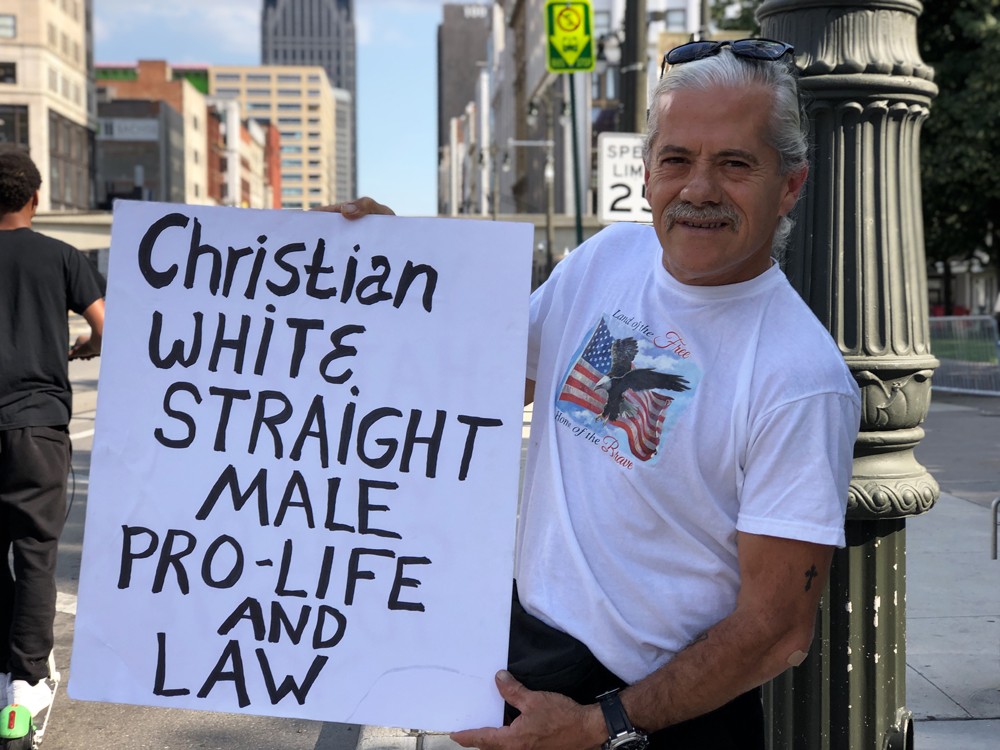The week after Donald Trump launched his racist attack on U.S. Representative Elijah Cummings, which came on the heels of his racist attacks on four nonwhite Democratic members of Congress, my hometown paper gave its resident MAGA apologist, J. Peder Zane, ink to argue that the president and his Republican Party are not, in fact, racist, but rather the victims of a "false narrative" painted by Democrats, who are the real racists.
While Trump may have been "insensitive" in calling a mostly Black congressional district with a median income above the national average "a disgusting rat- and rodent-infested mess," Zane tells us, a "fair-minded person, while hoping that the president would be more precise, should see that he is not a racist."
Four days later, a Trump-loving white nationalist murdered 20 people in an El Paso Walmart after posting a manifesto explaining — in language that uncannily mirrored Trump's immigration rhetoric — that he was fighting an "invasion."
Funny how the racists think Trump is one of them.
Lots of papers have third-tier hacks like Zane, men (always men) who crib their sophomoric understanding of U.S. history from low-rent hucksters like Dinesh D'Souza and regurgitate the outrage du jour from the Fox News/talk-radio set. These columns tend to land somewhere between intellectually vapid and irresponsibly dishonest; papers publish them as a fig leaf to the MAGA crowd, an effort to assure them that they're not part of the Liberal Media.
Like most, Zane is rarely worth rebutting. Here, however, he's recycling an argument common among Trump acolytes, which in light of El Paso warrants some scrutiny. His point is this: Republicans should ignore Democrats/liberals/the media when they say Trump is racist because Democrats/liberals/the media always say Republicans are racist.
As Zane puts it: "Before Trump, Democrats leveled the same despicable smear against Mitt Romney — Vice President Joe Biden warned African-Americans that Romney 'would put y'all back in chains!'" (Not to be pedantic, but Biden said Romney's policies would allow big banks to do so.) Before that, Zane continues, they called John McCain racist, and George W. Bush racist, "and so it goes with most every Republican back to Richard Nixon."
Quick history: Whatever Nixon's personal feelings (he really didn't like Jews, FYI), beginning with his 1968 campaign, racial appeals became central to GOP politics. See, for instance, Republican operative Lee Atwater's infamous quote: "You start out in 1954 by saying, 'Nigger, nigger, nigger.' By 1968 you can't say 'nigger' — that hurts you, backfires. So you say stuff like forced busing, states' rights, and all that stuff, and you're getting so abstract. Now, you're talking about cutting taxes, and all these things you're talking about are totally economic things and a byproduct of them is, blacks get hurt worse than whites.'"
Ronald Reagan denounced mythical welfare queens. George H.W. Bush ran the Willie Horton ad. George W. Bush's campaign smeared John McCain with rumors about his adopted Black child. McCain elevated Sarah Palin to the national stage, where she accused the first Black major party presidential nominee of "pallin' around with terrorists." Romney kissed Donald Trump's ring while Trump was pushing the racist birther effort. Trump launched his presidential campaign by calling Mexican immigrants rapists and pledging to ban Muslims.
Trump has been accused of racism more frequently because he says and does overtly racist things more frequently.
tweet this
What Zane doesn't consider is that GOP leaders have been accused of racism because they've employed racism to win votes. Trump has been accused of racism more frequently because he says and does overtly racist things more frequently.
Indeed, Trump's entire political career has been built on racial demagoguery (and numerous studies suggest that he owes his victory in 2016 in part to his voters' racial attitudes). But for his supporters to admit that would mean admitting an uncomfortable truth about themselves. So instead, they define the R-word so narrowly as to render it meaningless.
Truth be told, however, I'm less interested in what the J. Peder Zanes of the world tell themselves about Donald Trump's racism than in the effects their denial has on the rest of us.
It's no surprise, for instance, that Republicans don't want to talk about guns after El Paso. More unnerving has been their widespread reluctance to acknowledge the crisis of the increasingly violent white supremacist movement in the Trump era.
As a former FBI supervisor who oversaw terrorism cases told The Washington Post, "I think in many ways the FBI is hamstrung in trying to investigate the white supremacist movement like the old FBI would. There's some reluctance among agents to bring forth an investigation that targets what the president perceives as his base."
And if we can't even address white terrorism with offending Trump's supporters, how can we possibly begin to address complex, systemic issues of racial and social justice: wealth gaps, education gaps, opportunity gaps, affordability crises, etc.?
The thing about Trump is that he says the quiet parts loud — often through a megaphone. He's fundamentally incapable of hiding who he is. And that makes the choice ahead of us crystal clear: Between now and Election Day, we as a country will have to confront a lot of uncomfortable truths about who we are — and who we're going to be.
Stay on top of Detroit news and views. Sign up for our weekly issue newsletter delivered each Wednesday.


